1061 scholarly books by Catholic University of America Press and 89
start with P
1061 scholarly books by Catholic University of America Press and 89
1061 scholarly books by Catholic University of America Press
89 start with P start with P
89 start with P start with P
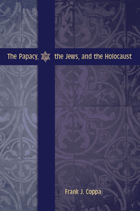
The Papacy, the Jews, and the Holocaust
Frank J. Coppa
Catholic University of America Press, 2006
This work not only examines Rome's reaction during the fascist period but delves into the broader historical development and the impact of theological anti-Judaism
[more]
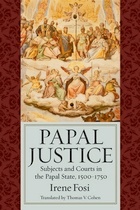
Papal Justice
Subjects and Courts in the Papal State, 1500-1750
Irene Fosi
Catholic University of America Press, 2011
This lively overview of the papal justice system reaches a transatlantic readership and makes available the fruit of Fosi's decades-long research in unpublished archives in Rome and the Vatican.
[more]

Papal Letters in the Early Middle Ages
Detlev Jasper
Catholic University of America Press, 2001
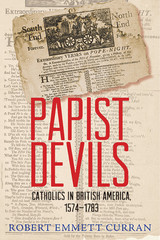
Papist Devils
Robert Emmett Curran
Catholic University of America Press, 2014
This is a brief highly readable history of the Catholic experience in British America, which shaped the development of the colonies and the nascent republic in the seventeenth and eighteenth centuries. Historian Robert Emmett Curran begins his account with the English reformation, which helps us to understand the Catholic exodus from England, Ireland, and Scotland that took place over the nearly two centuries that constitute the colonial period. The deeply rooted English understanding of Catholics as enemies of the political and religious values at the heart of British tradition, ironically acted as a catalyst for the emergence of a Catholic republican movement that was a critical factor in the decision of a strong majority of American Catholics in 1775 to support the cause for independence
[more]

Paradise in Purgatory
The Eschatological Healing of Victims in the Catholic Tradition
Nathan W. O'Halloran
Catholic University of America Press, 2024
The claim of this book is that it is a precondition for Heaven that victims experience an eschatological healing of their other-inflicted wounds. Nathan O’Halloran, SJ, argues that the best theological space in which to locate this eschatological healing is in what he terms Paradise-in-Purgatory. The doctrine of Purgatory developed as a postmortem theological category for addressing sins committed after baptism and for which adequate penance has not been completed before death. In its full doctrinal articulations at Lyons II, Florence, and Trent, Purgatory is a doctrine concerned with personal, self-inflicted sin. Victims, on the other hand, require healing from other-inflicted sin rather than self-inflicted sin. For this reason, a certain expansion of this Catholic doctrine is required to make theological space for victims.
O’Halloran argues that he has found that theological space within the Church’s ample tradition. The wellspring from which the doctrine of Purgatory emerged contains a richer content than has been represented thus far by conciliar definitions. Paradise in Purgatory maintains that the soteriological logic out of which Purgatory developed can be extended also to the postmortem healing of victims, and the soteriological logic of the New Testament supports this conclusion. Using as fundamental touchstones the wiping away of victims’ tears in the Book of Revelation, and the healing of Dinocrates through the prayers of his sister Perpetua in the Passion of Perpetua and Felicity, O’Halloran argues that victims must have an opportunity to experience full postmortem salvation from other-inflicted sin. The volume concludes that Purgatory can be theologically expanded to include a Paradise-in-Purgatory, i.e., a process that heals the other-inflicted wounds of sin which victims carry with them through death. The wounds of victims cannot be eschatologically discarded but must be subjected to the healing salvation which Christ came to offer.
[more]
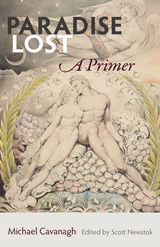
Paradise Lost
A Primer
Michael Cavanagh
Catholic University of America Press, 2020
A record of a teacher’s lifelong love affair with the beauty, wit, and profundity of Paradise Lost, celebrating John Milton’s un-doctrinal, complex, and therefore deeply satisfying perception of the human condition. After surveying Milton’s recurrent struggle as a reconciler of conflicting ideals, this Primer undertakes a book-by-book reading of Paradise Lost, reviewing key features of Milton’s “various style,” and why we treasure that style. Cavanagh constantly revisits Milton the singer and maker, and the artistic problems he faced in writing this almost impossible poem.
This book is emphatically for first-time readers of Milton, with little or no prior exposure, but with ambition to encounter challenging poetry. These are readers who tell you they “have always been meaning to read Paradise Lost,” who seek to enjoy the epic without being overwhelmed by its daunting learning and expansive frame of reference. Avoiding the narrowly specialized focus of most Milton scholarship, Cavanagh deals forthrightly with issues that recur across generations of readers, gathering selected voices—from scholars and poets alike—from 1674 through the present.
Lively and jargon-free, this Primer makes Paradise Lost accessible and fresh, offering a credible beginning to what is a great intellectual and aesthetic adventure.
[more]
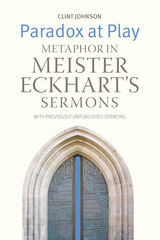
Paradox at Play
Metaphor in Meister Eckhart's Sermons: with previously unpublished sermons
Clint Johnson
Catholic University of America Press, 2022
Fresh translations of Meister Eckhart’s sermons are made available in this volume: three for the first time in English and sixteen others for the first time since C. de B. Evans translated them in 1924 and 1931, long before the critical editions of the manuscripts were published in 2003. Other important sermons are included in the translations as well. They improve upon previous translations which were not as sensitive to Eckhart’s metaphorical repertoire and his subtle word choice and phrasing.
The extended introductory essay describes Eckhart’s metaphors and how they work together to form a cohesive whole. By looking at what his metaphors tell us about what an individual person is and how the view of the individual changed in the late medieval world, his ostensibly shocking rhetoric (in places where it is actually novel) is shown to be indicative of a larger cultural tide that culminated in the modern worldview. Finally, all of his homiletic choices are shown to be in service of the greater goal: catalyzing transformative change in his audience by stubbornly insisting on his paradoxes and jarring people out of their customary way of relating to God and themselves.
[more]
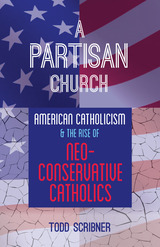
A Partisan Church
Todd Scribner
Catholic University of America Press, 2015
In the wake of Vatican II and the political and social upheavals of the 1960s, disruption and disagreement rent the Catholic Church in America. Since then a diversity of opinions on a variety of political and religious questions found expression in the church, leading to a fragmented understanding of Catholic identity. Liberal, conservative, neoconservative and traditionalist Catholics competed to define what constituted an authentic Catholic worldview, thus making it nearly impossible to pinpoint a unique "Catholic position" on any given topic. A Partisan Church examines these controversies during the Reagan era and explores the way in which one group of intellectuals - well-known neoconservative Catholics such as George Weigel, Michael Novak, and Richard John Neuhaus - sought to reestablish a coherent and unified Catholic identity.
[more]
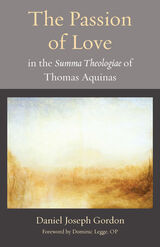
The Passion of Love in the Summa Theologiae of Thomas Aquinas
Daniel Joseph Gordon
Catholic University of America Press, 2023
This book is an introduction to three questions on love according to St. Thomas Aquinas (Summa Theologiae I–II, qq. 26–28). These three questions reflect on the nature of love (q. 26), the causes of love (q. 27), and the effects of love (q. 28). It is thus an introduction to the entire phenomenon of love, both as a bodily passion and an act of the will. The purpose is to present the Thomistic and broadly scholastic account of human and divine
love from a philosophical and theological perspective. It aims to be a theological and philosophical study of the topic, useful both for a graduate/professional audience, as part of an undergraduate or graduate course, and perhaps for the educated reader. The thesis of the book is that, contrary to contemporary conceptions, not all loves are created equal. Some loves perfect us and some loves corrupt us. The worth of a love depends on its object and end. St. Thomas thus presents an objective and teleological account of human and divine love that is of philosophical and theological interest. The method is broadly exegetical, presenting a careful reading of the text and supplying the philosophical and theological background which the text of Aquinas assumes. The scope of the work is limited to three questions (ST I–II, qq. 26–28). References to interpretative disputes of Aquinas and references to further resources in the secondary literature will be mostly limited to the footnotes, making the body of the text accessible to more readers.
[more]
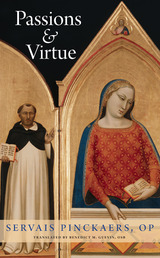
Passions and Virtue
Servais Pinckaers
Catholic University of America Press, 2015
This book, the last that noted moral theologian Servais Pinckaers, OP, wrote before his death, was conceived as a follow-up to his previous work Plaidoyer pour la vertu (An Appeal for Virtue) (2007) Pinckaers' aim in Passions and Virtue was to show the positive and essential role that our emotions play in the life of virtue. His purpose is part of a larger project of renewing moral theology, a theology too often experienced as an ethics of obligation rather than as a practical guide to living virtuously. To this end, Pinckaers sketches a positive psychology of the passions as found in the biblical tradition, in the writings of the Fathers of the Church, in pagan authors and, especially, in the writings of Saint Thomas Aquinas.
[more]
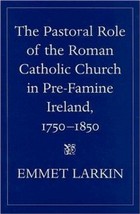
The Pastoral Role of the Roman Catholic Church in Pre-Famine Ireland, 1750–1850
Emmet Larkin
Catholic University of America Press, 2006
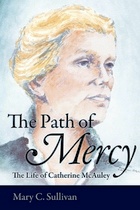
The Path of Mercy
The Life of Catherine McAuley
Mary C. Sullivan
Catholic University of America Press, 2012
Breaking new ground in presenting the life of Catherine McAuley (1778?-1841), the Dublin woman who founded the Sisters of Mercy, Mary C. Sullivan has written the first full-length, documented narrative of McAuley in more than fifty years.
[more]
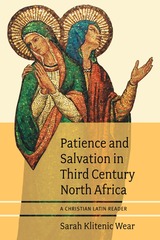
Patience and Salvation in Third Century North Africa
A Christian Latin Reader
Sarah Wear
Catholic University of America Press, 2022
Patience and Salvation in Third Century North Africa: A Christian Latin Reader features the entirety of Tertullian’s To Martyrs and The Passion of Perpetua and Felicity, with selections from Cyprian’s On the Good of Patience and a short appendix on Augustine’s Commentary on Psalm 121.6. The Latin text has facing vocabulary and theological, historical, philosophical, and grammatical notes.
In the first three centuries, Roman Carthage produced some of the earliest literature composed originally in Latin by Christians. Tertullian’s Ad Martyras (197); Passio Perpetuae et Felicitatis (203), and Cyprian’s De Bono Patientiae (256) all embody the force of this new genre of Latin literature. With this literature, we see a variant of Latin often denoted “Christian Latin.” Christian Latin featured linguistic elements marked by characteristics of biblical Latin, later Latin, as well as vulgarisms.
In addition to converging philologically, Tertullian, the author of the Passio, and Cyprian align themselves in topos: they all ask the question of how one can endure torment and anxiety in this world. Patience (patientia), derived from the verb for “to suffer” (patior), is a virtue that allows one to endure troubles, anxieties, and physical pains with the hope of eternal happiness and salvation in heaven. In this Reader, the student will find three different literary perspectives on this theme. The book also draws parallels to the works of Seneca and Cicero on patience and suffering.
[more]
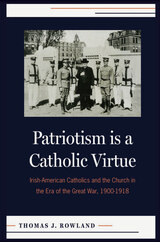
Patriotism is a Catholic Virtue
Irish-American Catholics, The American Church and the Coming of the Great War
Thomas J. Rowland
Catholic University of America Press, 2023
Most of the literature concerning the momentous challenges facing Irish American Catholics in the first two decades of the twentieth century pay but scant attention to the role played in addressing them by the American Church. Among the myriad political, social, cultural and economic issues confronting Irish American Catholics none stand out as prominently as the unabated burden of combatting scurrilous attacks upon them by nativist forces, the task of proving themselves as loyal American citizens, and navigating the perilous waves in advancing the course of directing Irish American nationalism and the cause of Ireland’s freedom.
Patriotism is a Catholic Virtue ferrets out the impact the institutional Church played in affecting the course of action Irish American Catholics took regarding these three crucial missions. Whereas the task of confronting the assaults of nativism, seemingly the natural task for the institutional Church, this study provides extensive evidence of the relentless defense of Catholic virtue conducted by diocesan newspapers. Similarly, the mission of promoting Catholics as loyal American citizens was largely left in the hands of the American hierarchy, its clergy, newspapers and Catholic societies and affiliates. Lastly, this book provides evidence that the Church may well have played the decisive role in guiding its Irish American faithful along paths that, while conservatively promoting Irish nationalism, did not jeopardize an “American First” policy for Catholics. All of this was accomplished in the crucible of an emerging worldwide war.
[more]
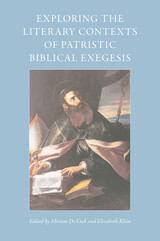
Patristic Exegesis in Context
Exploring the Genres of Early Christian Biblical Interpretation
Miriam De Cock
Catholic University of America Press, 2023
The essays of Patristic Exegesis in Context examine the biblical exegesis of early Christians beyond the formal genre of biblical commentary. The past couple of decades have seen a broadening of perspective on the study of patristic exegesis; the phenomenon is increasingly situated within its various literary contexts and genres, and the definition of what counts as patristic exegesis is therefore widened. This volume thus situates itself within this emerging scholarly tradition, which aims not to give an account of exegetical strategies and methodologies as found primarily in exegetical commentaries and homilies, but to demonstrate the highly sophisticated nature of biblical exegesis in other genres, and the manifold uses to which this exegesis was put. Ancient Christian authors lived and breathed scripture; it served as their primary source of theological and liturgical vocabulary, their way of processing the world, their social ethic, and their mode of constructing self and communal identity. Scripture therefore permeates all ancient Christian literature, regardless of genre, and the various contexts in which interpretation of scripture took place resulted in a wide variety of uses of the church’s authoritative texts. The essays in this volume demonstrate the interpretive skill, creativity, and sophistication of early Christian authors in a myriad of other early Christian genres, such as poetry, paraphrase, hymns, martyr accounts, homilies, prophetic vision accounts, monastic writings, argumentative treatises, encomia, apocalypses, and catenae. Accordingly, the volume aims to help the modern person, who is used to hearing the Bible explained in explicitly expository situations (for example, in academic commentaries or religious sermons) to become more habituated to ancient ways of interacting with and expounding the biblical text. These essays attempt to contextualize various types of patristic exegesis, in order for us to glimpse the complex and diverse uses of the Bible in this period.
[more]
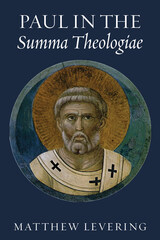
Paul in the Summa Theologiae
Matthew Levering
Catholic University of America Press, 2014
Aquinas's commentaries on St. Paul are well known and have received significant attention in the past few years. It is widely known, too, that Aquinas quotes Paul often in the Summa theologiae. This aspect of the Summa, however, has not been studied in detail. This book seeks to fill that lacuna in scholarship.
[more]

Peace in the Thought of Thomas Aquinas
Philosophy, Theology, and Ethics
John M. Meinert
Catholic University of America Press, 2024
What does Aquinas have to teach us on the topic of peace? Looking over the scholarly literature, one would think very little. Most Thomists ignore Aquinas’s thought on peace. Most peace researchers summarily dismiss Aquinas. Peace in the Thought of Thomas Aquinas challenges both these trends and offers the first book length study of peace in Aquinas’s thought.
John Meinert outlines Aquinas's historical predecessors, then provides an exposition and interpretation of the full scope of Aquinas's thought on peace: metaphysics, Trinitarian theology, Christology, Pneumatology, ecclesiology, natural theology, ethics, and sacramental theology. What emerges from this extended study is a new vision of Aquinas’s work. Peace in the Thought of Thomas Aquinas establishes Aquinas as an indispensable dialogue partner for anyone thinking rigorously about the theology, philosophy, and ethics of peace. As Aquinas himself says, “observe peace and you will come to salvation.”
[more]

Pellegrino's Clinical Bioethics
A Compendium
Edmund Pellegrino
Catholic University of America Press, 2023
Pellegrino’s Clinical Bioethics: A Compendium offers, for the first time, a collection of the landmark articles in clinical bioethics authored by the physician and philosopher, Edmund D Pellegrino. As one of the founding figures of modern medical ethics, Dr. Pellegrino gained international renown for his deeply reflective scholarship and for his public service in developing the field. In over 600 scholarly papers and two dozen books, he touched on topics in medical ethics, philosophy, and theology. Previous attempts to collect his work gave rise to a mixed assortment of his thoughts. This volume focuses purely on those topics in clinical bioethics that are sought after by healthcare professionals, professional and graduate students in these fields, and those involved with clinical bioethics in hospitals and clinics. His legacy and profound influence in the proper practice of the field of medicine is thus made accessible to present and subsequent generations.
[more]

Pensees
Blaise Pascal
Catholic University of America Press, 2021
Blaise Pascal (1623-1662) was a French mathematician, physicist, and religious philosopher, who laid the foundation for the modern theory of probabilities. The Pensées are made up of some 800 fragments, that have proven to be an enduring masterpiece since their initial publication in 1670.
This volume is a translation of Philippe Sellier’s edition of Pascal’s Pensées, in addition to two shorter texts, the Exchange with M. de Sacy and The Life of Monsieur Pascal by Pascal’s sister, Gilberte Périer. In addition to a Preface and an Introduction, there is a comprehensive apparatus criticus. The text was originally produced by a team of international Pascal scholars, who translated individual sections and was revised by the General Editor. The introduction situates the Sellier edition in the history of Pascal scholarship and highlights the advance its reordering of the fragments and of the folders or bundles represents, both the translation itself and the notes allow for a deeper reading of the text. It not only gives English readers a version of the authoritative Sellier edition of the collection of reflections known as The Pensées, it also proposes material which help assess the philosopher’s significance and the originality of his thought.
On the whole, this translation gives a comprehensive view of the progress of Pascal’s intended Apology of the Christian Religion as well as of other writings on related topics. It also provides today’s readers with a challenging set of arguments, prayer, and quotations from Scripture, and even the record of a mystical experience, known as the Memorial. It highlights all facets of Pascal’s genius, his familiarity with Scripture combined with a talent for controversy, irony mixed with fervor, and altogether the production of an intriguing and challenging writer and thinker.
[more]
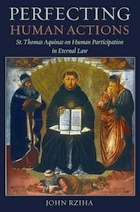
Perfecting Human Actions
St. Thomas Aquinas on Human Participation in Eternal Law
John Rziha
Catholic University of America Press, 2009
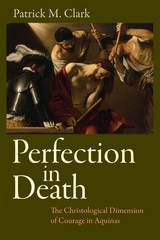
Perfection in Death
Patrick M. Clark
Catholic University of America Press, 2015
Perfection in Death compares and contrasts the relationship between conceptions of courage and death in the thought of Aquinas and his ancient philosophical sources. At the center of this investigation is Aquinas' identification of martyrdom as the paradigmatic act of courage as well as "the greatest proof of the perfection of charity." Such a portrayal of "perfection in death" bears some resemblance to the ancient tradition of "noble death", but departs from it in decisive ways. Clark argues that this departure can only be fully understood in light of an accompanying transformation of the metaphysical and anthropological framework underlying ancient theories of virtue. Perfection in Death aims to provide a new, theological account of this paradigm shift in light of contemporary Thomistic scholarship.
[more]
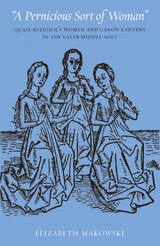
A Pernicious Sort of Woman
Quasi-Religious Women and Canon Lawyers in the Later Middle Ages (Studies in Medieval and Early Modern Canon Law, Volume 6)
Elizabeth Makowski
Catholic University of America Press, 2005
This book provides a thorough examination of the writings of canon lawyers in the late Middle Ages as they come to terms, both in their academic work and also in their roles as judges and advisers, with women who were not, strictly speaking, religious, but who were popularly thought of as such.
[more]
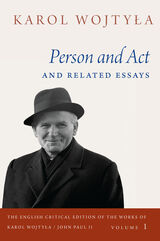
Person and Act and Related Essays
Karol Wojtyla
Catholic University of America Press, 2021
The Catholic University of America Press is honored to announce the publication of the first volume of the critical English edition of The Collected Works of Karol Wojtyła/John Paul II. In conjunction with an international editorial board, the English Critical Edition will comprise 20 volumes, covering all of his writings and correspondence both in the years before and during his papacy.
What makes this collection so important is that access to his writings have been a significant challenge. Except for official papal addresses and documents preserved and disseminated by the Vatican, his works have been scattered and limited, or in need of a new translation. Finally, English-language audiences have faced the challenge, even in the case of published texts, of working across multiple languages and translations and of dealing with textual idiosyncrasies.
The inaugural volume of this collection is Person and Act, together with related essays, which is in many respects constitutes Karol Wojtyła’s most profound and well-known philosophical work. Originally published in 1969 as Osoba I czyn, this work of metaphysics and philosophy is widely influential even though it is highly challenging intellectually and has heretofore posed difficulties for translators.
[more]
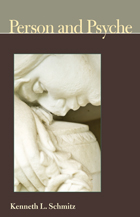
Person and Psyche
Kenneth L. Schmitz
Catholic University of America Press, 2009
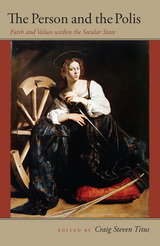
The person and the polis
faith and values within the secular state
Craig Steven Titus
Catholic University of America Press, 2006
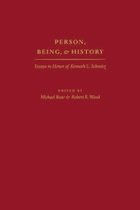
Person, Being, and History
Michael Baur
Catholic University of America Press, 2011
the various essays in this volume by colleagues and former students of Schmitz examine his thought and the subjects of his teaching. In addition to an overall exposition of his own thought, the collection treats themes such as gift, faith and reason, culture and dialogue, modernity and post-modernity
[more]
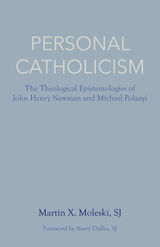
Personal Catholicism
The Theological Epistemologies of John Henry Newman and Michal Polanyi
Martin X. Moleski
Catholic University of America Press, 2020
"Both Newman and Polanyi rank high among the pioneers in the history of the post-critical movement in epistemology. They pointed out the limitations of the methods that had become current since the time of Descartes and Spinoza. . . . The systems of these two authors are exceptionally useful for dealing with the major issues that trouble the theological climate today."—From the Foreword by Avery Dulles, S.J.
"This engaging and lucid study brings into dialogue two thinkers whose methods share much in common despite their different purposes. . . . A principal contribution of Moleski's study is its cultivation of the common ground that religion shares with science."—Theological Studies
"An important and utterly engaging study. . . . Those familiar with Newman's Grammar of Assent and Polanyi's Personal Knowledge will appreciate the ways in which Moleski makes sometimes unexpected connections between the two thinkers, despite Polanyi's critical disposition toward Catholicism. Personal Catholicism is a most welcome contribution to today's rethinking of the relationship between faith and reason."—First Things
"There is a wealth of material here that could be applied to issues of faith and reason, science and faith, faith and the nature of reality as they are raised in contemporary society. . . ."—The Gospel and Our Culture
[more]
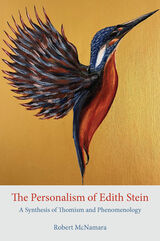
The Personalism of Edith Stein
A Synthesis of Thomism and Phenomenology
Robert McNamara
Catholic University of America Press, 2023
Edith Stein’s life and thought intersect with many important movements of life and thought in the twentieth century. Through her life and eventual martyrdom, she gave witness to the primacy of truth and faith in the face of political totalitarianism, and in her philosophical works, she contributed to a synthesis of phenomenological thought with the thought of Aquinas, while also progressively advancing a compelling form of philosophical personalism. As a result, Stein represents one of the most important Catholic thinkers of the twentieth century and is a figure of growing fascination and devotion among believers and nonbelievers alike.
The Personalism of Edith Stein is an investigation of Stein’s mature philosophical anthropology, exploring her engagement with the thought of Aquinas and Thomism while maintaining the phenomenological mode of investigation. Through a careful examination of Stein’s later works under the themes of human nature, the human individual, and the human being’s relation to God, McNamara shows that Stein’s mature personalism is considerably expanded and substantiated by her assimilation of key anthropological and metaphysical teachings of Aquinas and Thomism, and, conversely, that Stein significantly develops and deepens these same teachings through a phenomenological reconsideration of each from a personalist perspective.
As a whole, the study reveals the profound accord between Stein’s mature thought and the received teachings of Aquinas, while yet carefully attending to the remaining differences between them. Ultimately, the author proposes that Stein imbues the teachings of Aquinas with a fundamental personalization such that her mature anthropology can be understood as a Thomistically informed personalism that represents a significant, original contribution to the anthropological dimension of the philosophia perennis.
[more]
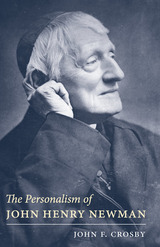
The Personalism of John Henry Newman
John Crosby
Catholic University of America Press, 2014
In The Personalism of John Henry Newman, Crosby shows the reader how Newman finds the life-giving religious knowledge that he seeks. He explores the "heart" in Newman and explains what Newman was saying when he chose as his cardinal's motto, cor ad cor loquitur (heart speaks to heart). He explains what Newman means in saying that religious truth is transmitted not by argument but by "personal influence."
[more]
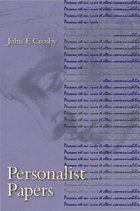
Personalist Papers
John F. Crosby
Catholic University of America Press, 2004
In Personalist Papers, John F. Crosby continues the discussion of Christian personalism begun in his highly acclaimed book, The Selfhood of the Human Person.
[more]
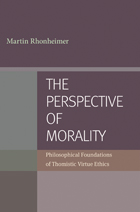
The Perspective of Morality
Philosophical Foundations of Thomistic Virtue Ethics
Martin Rhonheimer
Catholic University of America Press, 2011
The Perspective of the Acting Person introduces readers to one of the most important and provocative thinkers in contemporary moral philosophy
[more]
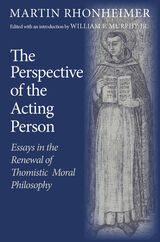
The Perspective of the Acting Person
Essays in the Renewal of Thomistic Moral Philosophy
Martin Rhonheimer
Catholic University of America Press, 2008
The Perspective of the Acting Person introduces readers to one of the most important and provocative thinkers in contemporary moral philosophy
[more]

Peter Comestor's Lectures on the Glossed Gospel of John
A Study with a Critical Edition and Translation
Peter Comestor
Catholic University of America Press, 2023
This monograph encompasses the first critical edition, translation, and historical study of a series of lectures from the cathedral school of Notre-Dame, Peter Comestor’s Glosses on the Glossed Gospel of John. Delivered in Paris in the mid-1150s, Comestor’s expansive lecture course on the Glossa ordinaria on the Gospel of John has survived in no fewer than seventeen manuscript witnesses, being preserved in the form of continuous transcripts taken in shorthand by a student-reporter (reportationes). The editor has selected the fifteen best witnesses to produce a critical edition and translation of the first chapter of Comestor’s lectures on the Gospel of John. In addition to the text of the original lectures, the edition includes appendices containing accretions to the lecture materials added by Comestor and his students, as well as the corresponding text of the Glossa ordinaria from which Comestor lectured.
The Latin text and translation of Peter Comestor’s lectures are preceded by a wide-ranging critical study of the historical and intellectual context of Peter Comestor’s biblical teaching. This study begins with an outline of Comestor’s scholastic career and known works, with a detailed introduction to his Gospel lectures and the relevant historiography. Subsequently, a survey is made of the intellectual landscape of Comestor’s lectures: namely, the tradition of biblical teaching originating at the School of Laon, preserved in the Glossa ordinaria, and developed in the classroom by Peter Lombard and a succession of Parisian masters, notably Comestor himself. The following section examines the portion of the lectures presented in this book, encompassing an overview of its contents and structure, a description of Comestor’s teaching method and scholastic setting, a study of the text’s sources, and a consideration of Comestor’s participation and reception in the scholastic tradition. The final chapters contain a careful description of the manuscripts and editorial principles adopted in the Latin edition and translation.
[more]
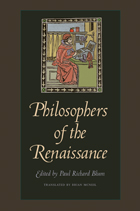
Philosophers of the Renaissance
Paul Richard Blum
Catholic University of America Press, 2010
Philosophers of the Renaissance introduces readers to philosophical thinking from the end of the Middle Ages through the sixteenth century.
[more]
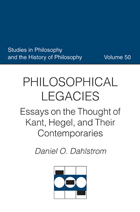
Philosophical Legacies
Essays on the Thought of Kant, Hegel, and Their Contemporaries (Studies in Philosophy and the History of Philosophy, Volume 50)
Daniel O. Dahlstrom
Catholic University of America Press, 2008
The essays trace carefully the histories of the influences of earlier thinkers and their legacies upon later thinkers.
[more]
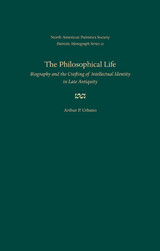
The Philosophical Life
Arthur P. Urbano
Catholic University of America Press, 2013
Ancient biographies were more than accounts of the deeds of past heroes and guides for moral living. They were also arenas for debating pressing philosophical questions and establishing intellectual credentials, as Arthur P. Urbano argues in this study of biographies composed in Late Antiquity
[more]
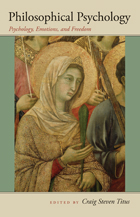
Philosophical psychology
psychology, emotions, and freedom
Craig Steven Titus
Catholic University of America Press, 2009
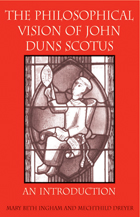
The Philosophical Vision of John Duns Scotus
An Introduction
Mary Beth Ingham
Catholic University of America Press, 2004
In this much-anticipated work, distinguished authors Mary Beth Ingham and Mechthild Dreyer present an accessible introduction to the philosophy of the thirteenth century Franciscan John Duns Scotus
[more]
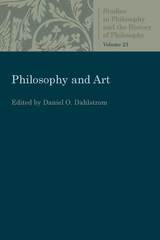
Philosophy and Art
Daniel O. Dahlstrom
Catholic University of America Press, 2018
The 13 essays in this collection are marked by a diversity of philosophical styles and perspectives on art. While some authors focus on specific forms of art, others are more concerned with the interpretation given to art by past and contemporary philosop
[more]
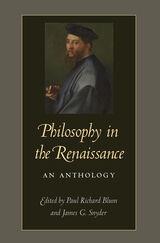
Philosophy in the Renaissance
An Anthology
Paul Richard Blum
Catholic University of America Press, 2022
The Renaissance was a period of great intellectual change and innovation as philosophers rediscovered the philosophy of classical antiquity and passed it on to the modern age. Renaissance philosophy is distinct both from the medieval scholasticism, based on revelation and authority, and from philosophers of the seventeenth and eighteenth centuries who transformed it into new philosophical systems.
Despite the importance of the Renaissance to the development of philosophy over time, it has remained largely understudied by historians of philosophy and professional philosophers. This anthology aims to correct this by providing scholars and students of philosophy with representative translations of the most important philosophers of the Renaissance. Its purpose is to help readers appreciate philosophy in the Renaissance and its importance in the history of philosophy. The anthology includes translations from philosophers from the thirteenth to the seventeenth centuries, and it ranges from works on moral and political philosophy, to metaphysics, epistemology, and natural philosophy, thereby providing historians and students of philosophy with a sense for the nature, breadth, and complexity of philosophy in the Renaissance. Each translation is accompanied by an introduction by a historian of Renaissance philosophy, as well as select secondary sources, in order to encourage further study.
This anthology is a companion to Philosophers of the Renaissance, edited by Paul Richard Blum and published by Catholic University of America Press in 2010, which included essays on the writings of the same group of philosophers of the Renaissance: Raymond Llull, Gemistos Plethon, George of Trebizond, Basil Bessarion, Lorenzo Valla, Nicholas of Cusa, Leon Battista Alberti, Giovanni Pico della Mirandola, Marsilio Ficino, Pietro Pomponazzi, Niccolò Machiavelli, Heinrich Cornelius Agrippa von Nettesheim, Juan Luis Vives, Philipp Melanchthon, Petrus Ramus, Bernardino Telesio, Jacopo Zabarella, Michel de Montaigne, Francesco Patrizi, Giordano Bruno, Francisco Suàrez, Tommaso Campanella.
[more]
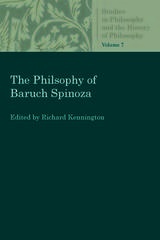
The Philosophy of Baruch Spinoza
Richard Kennington
Catholic University of America Press, 2018
This volume is a collection of articles that looks at the work of Baruch Spinoza through his metaphysics, his philosophy of politics and religion, and alternative approaches to Spinoza.
[more]
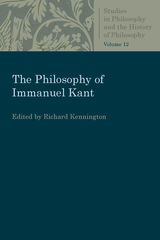
The Philosophy of Immanuel Kant
Richard Kennington
Catholic University of America Press, 2018
A collection devoted to mark the bicentennial of the publication of Kant's Critique of Pure Reason.
[more]
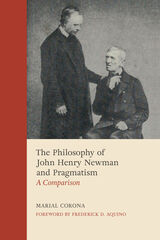
The Philosophy of John Henry Newman and Pragmatism
A Comparison
Marial Corona
Catholic University of America Press, 2023
In recent years, interest in John Henry Newman as a philosopher has gained momentum. This work places his philosophical insights in conversation with philosophers from the pragmatic tradition, particularly with C. S. Peirce, the classical pragmatists, and those who have followed their line, and shows several lines of concurrence. It argues that Newman overcame the modern philosophy of his time by reconnecting to the Aristotelian tradition in a very similar way to how Peirce did it fifty years later and the new pragmatists a century after.
Without claiming that Newman is a pragmatist philosopher, pragmatism is used as a foil, or point of access, to delve into Newman’s philosophy and bring forth the richness of his thought while placing him in the canon of philosophy. This approach deepens the understanding of his philosophical contributions and widens their reach to circles that have previously not engaged with him. Further, this study provides a means to understand pragmatism’s resources from a seldom-used vantage point and perhaps appreciate its fruitfulness in a new way.
Much emphasis is placed in Newman’s texts that refer to his search for and commitment to the truth. The particular nuances of his thought that are brought to light showcase the effective intellectual resources that his writings contain. Newman does not provide ready-made answers to today’s questions, but the way he analyzes and engages with the quandaries of his time can point us to creative and fruitful ways of engaging with those of our times.
[more]
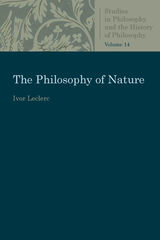
The Philosophy of Nature
Ivor Leclerc
Catholic University of America Press, 2018
The philosophy of nature is a field of inquiry which had been a casualty of the increasing and dominant acceptance from the early 19th century of the conception of physics as a mechanics.
[more]
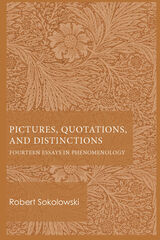
Pictures, Quotations, and Distinctions
Fourteen Essays in Phenomenology
Robert Sokolowski
Catholic University of America Press, 2022
One of the major contributions of Husserl’s phenomenology has been to show that things present themselves to us in strikingly different ways. There are various kinds of presentations and something like logical structures in them that allow the truth of things to appear. Being pictured is different from being named, and also different from being distinguished from something else. The fourteen essays in this volume provide concrete and colorful examples of strategic forms of presentation, and they also shed light on us as persons who exercise our intelligence when we let things appear in these various ways. Even our moral conduct takes place because something appears to us as to be done or to be avoided in a situation that calls for action.
When we quote what someone has said, for example, we express things as they have been expressed by someone else, and we invoke the authority of that other speaker. In measurement, we either bring external units, such as inches or yards, to determine the “how much” of things; or we engage in “internal measurement” and use one part of the object to determine the size of the whole. In moral action, the deep core of what we do involves either benevolence or malevolence, and in such conduct we shape or confirm ourselves as good or bad. Even the timing of things, the measurement of their motions and the determination of their before and after, in both clock and calendar time, cannot take place without the involvement of the person’s own interwoven perceptions, remembrances, and anticipations, all held together by the underlying flow of personal as well as worldly temporality.
The essays in this book are an attempt to blend the philosophical approaches of Aristotle and Husserl, the classical and the modern, to help us appreciate what Aristotle called “being as the true,” and to show how the human person is involved in this enterprise.
[more]
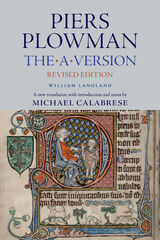
Piers Plowan
The A Version, Revised Edition
William Langland
Catholic University of America Press, 2023
Passionate about trying to create social justice in a time of crisis after the Black Plague, William Langland spent his entire life working on Piers Plowman, an epic study of the human quest for truth, justice, and community. The "A Version," the first and shortest of the three versions he crafted, is wonderfully relatable and completely teachable to a modern student audience. Piers Plowman is becoming ever more relevant to students and scholars in English studies. Perhaps because the poem involves culture, religion, community, and work and engages explicitly with the histories of government and popular revolt, this allegorical tale of a wandering Christian named "Will," searching for truth with the aid of a humble plowman named Piers, has found new critical and pedagogic life in the last 20 years. Currently there are no translations of the A-version of Piers Plowman in print, so readers, scholars and teachers have been longing for an affordable, student-centered translation. The apparatus includes a 30-page historical and critical introduction, footnotes, a bibliography, a note on translation theory and practice, and samplings of the original text in Middle English, with a guide to pronunciation of that language.
Piers Plowman is an extraordinary important document about the issues dramatically relevant to this day. It confronts poverty and inequity in 14th-century England and explores the need for virtue and social justice, encouraging its readers to create equality with open access for people of all classes and abilities. Though a Christian poem, Piers addresses issues of inclusivity, social responsibility and communal duty, as the poem’s protagonist wanders about the world, facing injustice and persecution as he looks for truth and salvation. Michael Calabrese, author of An Introduction to Piers Plowman and director of the Chaucer Studio’s Middle English recording of the poem, brings Piers Plowman to life for 21st-century students and for all readers interested in the history of society, virtue, faith and salvation.
[more]
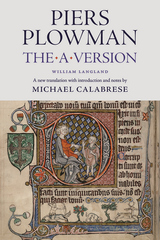
Piers Plowman
The A Version
William Langland
Catholic University of America Press, 2020
Passionate about trying to create social justice in a time of crisis after the Black Plague, William Langland spent his entire life working on Piers Plowman, an epic study of the human quest for truth, justice, and community. The “A Version,” the first and shortest of the three versions he crafted, is wonderfully relatable and completely teachable to a modern student audience. Piers Plowman is becoming ever more relevant to students and scholars in English studies. Perhaps because the poem involves culture, religion, community, and work and engages explicitly with the histories of government and popular revolt, this allegorical tale of a wandering Christian named “Will,” searching for truth with the aid of a humble plowman named Piers, has found new critical and pedagogic life in the last 20 years. Currently there are no translations of the A-version of Piers Plowman in print, so readers, scholars and teachers have been longing for an affordable, student-centered translation. The apparatus includes a 30-page historical and critical introduction, footnotes, a bibliography, a note on translation theory and practice, and samplings of the original text in Middle English, with a guide to pronunciation of that language.
Piers Plowman is an extraordinary important document about the issues dramatically relevant to this day. It confronts poverty and inequity in 14th-century England and explores the need for virtue and social justice, encouraging its readers to create equality with open access for people of all classes and abilities. Though a Christian poem, Piers addresses issues of inclusivity, social responsibility and communal duty, as the poem’s protagonist wanders about the world, facing injustice and persecution as he looks for truth and salvation. Michael Calabrese, author of An Introduction to Piers Plowman and director of the Chaucer Studio’s Middle English recording of the poem, brings Piers Plowman to life for 21st-century students and for all readers interested in the history of society, virtue, faith and salvation.
[more]
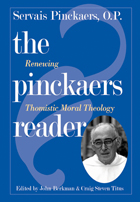
The Pinckaers Reader
Renewing Thomistic Moral Theology
Servais Pinckaers O.P.
Catholic University of America Press, 2005
The first collection of its kind available in any language, this volume features the twenty most significant essays written by Pinckaers since his highly praised Sources.
[more]
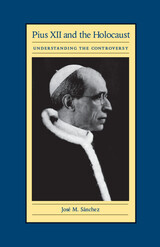
Pius XII and the Holocaust
Understanding the Controversy
José M. Sánchez
Catholic University of America Press, 2002
In this highly accessible work, José M. Sánchez offers a new approach to the controversy.
[more]
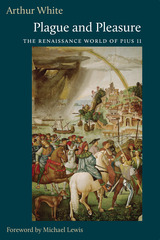
Plague and Pleasure
The Renaissance World of Pius II
Arthur White
Catholic University of America Press, 2014
Plague and Pleasure is a lively popular history that introduces a new hypothesis about the impetus behind the cultural change in Renaissance Italy. The Renaissance coincided with a period of chronic, constantly recurring plague, unremitting warfare and pervasive insecurity. Consequently, people felt a need for mental escape to alternative, idealized realities, distant in time or space from the unendurable present but made vivid to the imagination through literature, art, and spectacle.
[more]
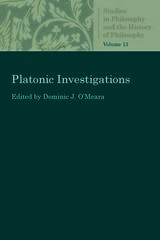
Platonic Investigations
Dominic J. O'Meara
Catholic University of America Press, 2018
This collection of papers is devoted to the significance of particular formal and literary aspects of the Platonic dialogues.
[more]
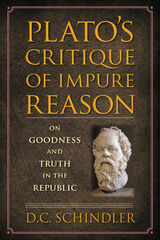
Plato's Critique of Impure Reason
On Goodness and Truth in the Republic
D. C. Schindler
Catholic University of America Press, 2008
Plato's Critique of Impure Reason offers a dramatic interpretation of the Republic, at the center of which lies a novel reading of the historical person of Socrates as the "real image" of the good
[more]
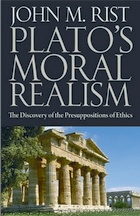
Plato's Moral Realism
The Discovery of the Presuppositions of Ethics
John M. Rist
Catholic University of America Press, 2012
Surveying many of Plato's dialogues from the early, middle, and late periods, prominent philosopher John M. Rist shows how Plato gradually came to realize the need for metaphysics to support his ethical position and that a rigorous ethics required a secure metaphysics grounded in universal values.
[more]
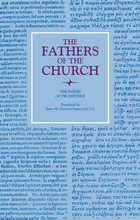
Poems, Volume 1
Prudentius
Catholic University of America Press, 1962
No description available
[more]
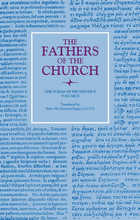
Poems, Volume 2
Prudentius
Catholic University of America Press, 1965
No description available
[more]
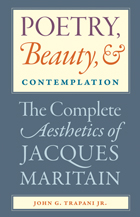
Poetry, Beauty, and Contemplation
The Complete Aesthetics of Jacques Maritain
John G. Trapani Jr.
Catholic University of America Press, 2011
Poetry, Beauty, and Contemplation provides a basic introduction to, and an extensive examination of, Maritain's philosophy of art and beauty
[more]
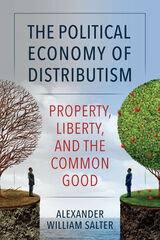
The Political Economy of Distributism
Property, Liberty, and the Common Good
Alexander William Salter
Catholic University of America Press, 2023
In recent years, prominent scholars, public intellectuals, and politicians have advocated reforming America’s economic model to embrace “common-good capitalism.” Catholic social teaching is a major influence on this movement. Is common-good capitalism compatible with the historical American commitments to private property rights and ordered liberty? What resources from Catholic social teaching can help orient free enterprise towards the common good? This book is the first scholarly inquiry into these exciting new questions.
We can better understand common-good capitalism by exploring the political economy of distributism. Formulated in the early 20th century by prominent Catholic intellectuals such as Hilaire Belloc and G.K. Chesterton, distributism emphasizes the importance of widely dispersed property ownership for human flourishing. Distributist thinkers, opposed both to capitalism and socialism, sought a humane approach to politics and economics that reflected the truths of Catholic social teaching.
Some of the distributists’ claims about markets and government must be revised in light of contemporary social science. Nevertheless, their political-economic vision contains profound truths about the human condition, which social scientists would be unwise to ignore. Distributism’s insights about the nature of liberty and the social foundations of human dignity can improve ongoing conversations among economists, political scientists, and philosophers.
The Political Economy of Distributism explores distributism both as a research program and a blueprint for political-economic reform. As many are reconsidering the relationship between markets and government, this timely book demonstrates the perennial relevance of the Catholic intellectual tradition to public affairs. Academics, public servants, policy experts, and concerned citizens can all benefit from this timely study of common-good capitalism’s prospects.
[more]
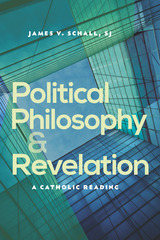
Political Philosophy and Revelation
James V. Schall, SJ
Catholic University of America Press, 2013
A collection of Fr. James Schall's recent essays, Political Philosophy and Revelation offers a learned, erudite, and coherent statement on the relationship between reason and revelation in the modern world. It addresses political philosophy in the context of an awareness of other humane and practical sciences, including history, literature, economics, theology, ethics and metaphysics.
[more]
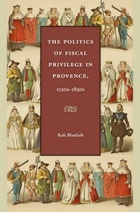
The Politics of Fiscal Privilege in Provence, 1530s-1830s
Rafe Blaufarb
Catholic University of America Press, 2012
Rafe Blaufarb examines the interwoven problems of taxation and social privilege in this treatment of the contention over fiscal privilege between the seigneurial nobility and the tax-payers of Provence
[more]
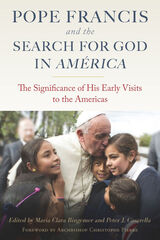
Pope Francis and the Search for God in America
The Significance of His Early Visits to the Americas
Maria Clara Bingemer
Catholic University of America Press, 2021
In Tutti Fratelli, Pope Francis has called again for a “culture of encounter,” But how should his theology, pastoral practice, and social message be understood and applied in the Church of the Americas, a single but complex reality that extends from South to North? This volume offers analyses from experts looking back to the Argentine pontiff’s first fateful encuentros in the Americas as a help for understanding the present reality of the Church in the Western Hemisphere. The group includes theologians, historians, and political scientists, and the unique contribution of the volume lies in the panoramic perspective offered by the book as a whole.
The initial essays set the stage for the volume as a whole, offering rich insight into Argentine and Latin American history, the world from which the Pope came and to which he returned in 2015, as well as surveying the impact of the Latin American “theology of the people” on the Pope’s visit to the U.S.
Additional essays address theological, historical, and pastoral engagements that cut across several of the visits. The final group of essays is dedicated to the visits themselves and is arranged in the order that they occurred. Pope Francis and the Search for God in América is offered to all the members of the Church in América, South and North, old and young, with the hope that it will spur even more thought, reflection, prayer, and service.
[more]
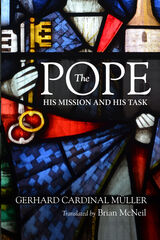
The Pope
His Mission and His Task
Gerhard Cardinal Muller
Catholic University of America Press, 2021
This book offers an introduction to the theological and historical aspects of the papacy, an office and institution that is unique in this world. Throughout its history up to our present time, the Petrine ministry is both fascinating and challenging to people, both inside and outside the Catholic Church.
Gerhard Cardinal Müller speaks from a particular and personal viewpoint, including his experience of working closely with the pope every day as Prefect of the Congregation for the Doctrine of the Faith. He addresses, in particular, those dimensions of the papal office which are crucial for understanding more deeply the pope as a visible principle of the church’s unity.
500 years after the Protestant reformation, the book offers insights into the ecumenical controversies about the papacy throughout the centuries, in their historical context. The book also exposes prejudices and cliches, and points to the authentic foundation of the Petrine ministry.
[more]
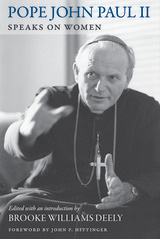
Pope John Paul II Speaks on Women
Brooke Williams Deely
Catholic University of America Press, 2014
In Pope John Paul II Speaks on Women, Brooke Williams Deely presents a comprehensive record of John Paul II's reflections. This collection brings to the forefront the full context and content of his original contributions. Since John Paul II encouraged women and men to expand what he has adumbrated, this book facilitates ongoing dialogue. The principle of the organization of the volume is chronological, compiling John Paul II's teachings on the subject of women arranged by date over the entire term of his Papacy. Since this influential Pope addressed the situation of women from the beginning of his pontificate, this overview of his writings and his spoken addresses best showcases the development and historical context of his thought.
[more]
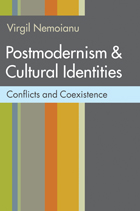
Postmodernism and Cultural Identities
Conflicts and Coexistence
Virgil Nemoianu
Catholic University of America Press, 2010
Virgil Nemoianu's book starts from the assumption that, whether we like it or not, we live in a postmodern environment, one characterized by turbulence, fluidity, relativity, commotion, uncertainty, and lightning-fast communication and change.
[more]

The Power of God
Dynamis in Gregory of Nyssa's Trinitarian Theology
Michel René Barnes
Catholic University of America Press, 2001
This study will be useful for those who study the development of the doctrine of the Trinity, as well as those who are interested in the role of scriptural and philosophical resources in Christian theology. Fi
[more]
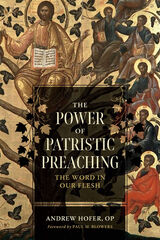
The Power of Patristic Preaching
The Word in Our Flesh
Andrew Hofer, OP
Catholic University of America Press, 2023
The Word made flesh is manifested in the lives of those dedicated to his proclamation. The Power of Patristic Preaching: The Word in Our Flesh presents seven early preachers who show, by life and speech, the divine Word’s power at work in weak human life.
The book is inspired by this question preached by Origen, “For what does it profit if I should say that Jesus has come in that flesh alone which he received from Mary and I should not show also that he has come in this flesh of mine?” In seven chapters, The Power of Patristic Preaching studies the exemplars of Origen for holiness, Ephrem for the humility of repentance, Gregory of Nazianzus for purification and faith, John Chrysostom for the hope of salvation, Augustine for love, Leo the Great for love of the poor and the weak, and Gregory the Great for accepting our own weakness.
With an emphasis on the incarnation, deification through the virtues, and proclamation, The Power of Patristic Preaching serves as a resource for those dedicated to the ministry of the Word (clerical, religious, and lay), and as a text for students of early Christian theology and practices. A Catholic work for a broad ecumenical audience, the book gives a cry from the heart in a suffering Church traveling through a world that is passing away.
[more]
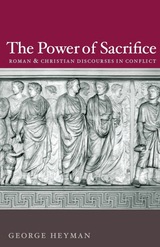
The Power of Sacrifice
Roman and Christian Discourses in Conflict
George Heyman
Catholic University of America Press, 2007
In this work, George Heyman offers a fresh perspective on the similarities between pagan Roman and Christian thinking about the public role of sacrifice in the first two and a half centuries of the Christian era.
[more]
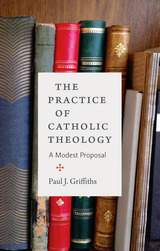
The Practice of Catholic Theology
Paul J. Griffiths
Catholic University of America Press, 2016
In The Practice of Catholic Theology: A Modest Proposal, Paul J. Griffiths has written a how-to book for Catholic theologians that will both instruct beginners and challenge long-time practitioners to sharpen their understanding of their craft. He defines Catholic theology as the practice of thinking, speaking, and writing about the God of Christian confession; so understood, it's something that anyone can learn to do. Personal sanctity is not required, but as with any other practice, practitioners of this beautiful and elevated thought-performance need to know some things and to develop some skills in order to be able to perform it.
[more]
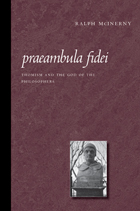
Praeambula Fidei
Thomism and the God of the Philosophers
Ralph McInerny
Catholic University of America Press, 2006
In this book, renowned philosopher Ralph McInerny sets out to review what Thomas meant by the phrase and to defend a robust understanding of Thomas's teaching on the subject.
[more]
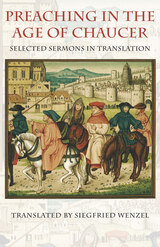
Preaching in the Age of Chaucer
Selected Sermons in Translation (Medieval Texts in Translation Series)
Siegfried Wenzel
Catholic University of America Press, 2008
Introducing modern readers to the riches of preaching in later medieval England, distinguished scholar Siegfried Wenzel offers translations of twenty-five Latin sermons written between 1350 and 1450. T
[more]
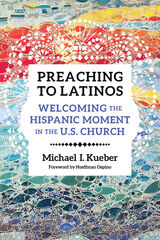
Preaching to Latinos
Welcoming the Hispanic Moment in the U.S. Church
Michael Kueber
Catholic University of America Press, 2022
There is a wide and growing gap in the Catholic Church in the United States between the clergy, who are mostly of European descent, and the large percentages of Catholics who identify as Latinos. While the US Church has made a concerted effort to build Hispanic ministries, many clergy and lay ministers are still ill-equipped to understand the cultural background of their parishioners, especially the large numbers who are foreign born. Because of this disconnect, the Church risks missing "the Hispanic Moment" in the US Church, in which the faith and traditions of these newest waves of US immigration could not just exist in parallel to English-language congregations, but enrich and enliven the faith of the whole community while passing on the faith to subsequent generations.
Learning Spanish--while helpful--is not enough. There are intercultural competencies that can only be developed through practice, but it also helps already-busy clergy to have a concise guide. In addition to knowing the scholarly literature on cross-cultural preaching and Hispanic culture, Father Michael Kueber has twenty years of experience serving first generation Hispanic immigrants and their second generation children. In Preaching to Latinos, Kueber provides the readers with best practices for preaching to and leading their churches. As a member of an ecumenical community, he is able to speak to members of all Christian denominations.
[more]
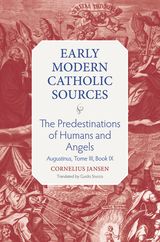
The Predestination of Humans
Augustinus, Tome III, Book IX
Cornelius Jansen
Catholic University of America Press, 2022
No other theological text polarized the early modern Catholic world as much as Cornelius Jansen's Augustinus. In it the erudite bishop not only reconstructed St. Augustine's teaching on grace and free will, but also boldly claimed that his views were in line with the Council of Trent and the Society of Jesus. For Jansen the latter had marginalized the Church Father's doctrine on divine predestination by overemphasizing human free will. Published after his death in 1640, Jansen's work drew a large crowd of followers and inspired an Augustinian reform movement. Its papal condemnation unintentionally spread this theology, but stifled an impassionate, academic engagement with the Augustinus. This first-ever translation of some of its central chapters enables historians, philosophers and theologians to finally engage with the founding text of Jansenism.
[more]
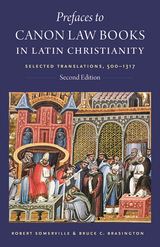
Prefaces to Canon Law Books in Latin Christianity
Selected Translations, 500-1317, second edition
Robert Somerville
Catholic University of America Press, 2021
An updated and expanded version of the original edition, published in 1998. That original edition went up through 1245. This new version extends to 1317 and adds two important prefaces.
Praise for the First Edition
“Both students and specialists can be grateful to the authors for this major contribution in English to the study of medieval canon law. It is a clear statement--one emphasized by the late John Gilchrist-that because of its critical importance in medieval life and culture canon law should not remain the obscure domain of specialists, but should be shared with students and non-specialists alike.” – The American Journal of Legal History
“[A] learned and useful book, which for the first time assembles a body of canonistic prefaces, presents them in an accessible form, and provides students of medieval canonical thought with a valuable new resource for study and teaching.” – The Catholic Historical Review
“This volume is an important and welcome addition to a field of studies where translations into English are few and far between. The breadth of the works selected, the quality of the translations, and the attention to detail that has long characterized the work of both editors make this a valuable resource for specialist and student alike.” – Church History
“A welcome combination: a text that is informative for students and professionals alike. The translations succeed in rendering accessible to a general audience some otherwise highly inaccessible material. Somerville and Brasington are to be greatly commended for undertaking this very original enterprise and bringing it to successful parturition.” – Journal of Law and Religion
“Somerville and Brasington have chosen to let their compilers and commentators speak for themselves. In doing so, they have had to wrestle with often obscure Latin and frequently less than satisfactory editions. That they succeed in making these texts intelligible through translation and annotation is no small feat.” – Sixteenth Century Journal
“This is a significant, elegantly presented contribution to the field of theology, cultural history, and canon law.” – Theological Studies
[more]
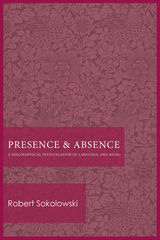
Presence and Absence
A Philosophical Investigation of Language and Being
Robert Sokolowski
Catholic University of America Press, 2017
“Presence and Absence is a book of importance for all who are actively engaged in the philosophical enterprise, whatever their differing persuasions. It shows philosophy to be flourishing in the midst of its own self-proclaimed signs of morbidity.” – The Review of Metaphysics
“A splendid, provocative and profound work, this book explores the manifold ways in which the contrast of presence and absence operate to establish the possibility of human discourse and truthfulness…belongs in every philosophy collection.” – Choice
“Quite simply a superb book, which deserves more than one careful reading. A fresh, unified treatment of a grand philosophical theme, the theme of the connections between thought, truth, and being.” – Man and World
“A thoughtful book about thoughtfulness and truthfulness and their ontological conditions. Simply put, this is a book that will reward its careful reader a hundredfold, for Sokolowski is a speaker who says things in ways that are provocative, exciting, and invariably insightful.” – Journal of the British Society for Phenomenology
“Has few peers in phenomenological literature.” – International Philosophical Quarterly
“[Sokolowski is] an original thinker of the first rank, who has significantly furthered the path of phenomenological philosophy. As well as being an exciting synthesis, a thinking of the previously unthought in predecessors, and a ground-breaking movement, this work is written with a sensitivity to language and its graceful use that one would hope for from one exploring its richness and power.” – Human Studies
“A splendid, provocative and profound work, this book explores the manifold ways in which the contrast of presence and absence operate to establish the possibility of human discourse and truthfulness…belongs in every philosophy collection.” – Choice
“Quite simply a superb book, which deserves more than one careful reading. A fresh, unified treatment of a grand philosophical theme, the theme of the connections between thought, truth, and being.” – Man and World
“A thoughtful book about thoughtfulness and truthfulness and their ontological conditions. Simply put, this is a book that will reward its careful reader a hundredfold, for Sokolowski is a speaker who says things in ways that are provocative, exciting, and invariably insightful.” – Journal of the British Society for Phenomenology
“Has few peers in phenomenological literature.” – International Philosophical Quarterly
“[Sokolowski is] an original thinker of the first rank, who has significantly furthered the path of phenomenological philosophy. As well as being an exciting synthesis, a thinking of the previously unthought in predecessors, and a ground-breaking movement, this work is written with a sensitivity to language and its graceful use that one would hope for from one exploring its richness and power.” – Human Studies
[more]
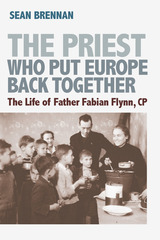
The Priest Who Put Europe Back Together
The Life of Rev. Fabian Flynn, CP
Sean Brennan
Catholic University of America Press, 2018
Philp Fabian Flynn led a remarkable life, bearing witness to some of the most pivotal events of the twentieth century. Flynn took part in the invasions of Sicily and Normandy, the Battle of Aachen, and the Battle of the Hürtgen Forest. He acted as confessor to Nazi War Criminals during the International Military Tribunal at Nuremberg, assisted Hungarian Revolutionaries on the streets of Budapest, and assisted the waves of refugees arriving in Austria feeling the effects of ethnic and political persecution during the Cold War. The Priest Who Put Europe Back Together tells the story of this fascinating life. From solidly middle-class beginnings in Dorchester, Massachusetts, Flynn interacted with and occasionally advised some of the major political, military, and religious leaders of his era. His legacy as a Passionist priest, a chaplain in the US Army, and an official in the Catholic Relief Services was both vast and enormously beneficial. His life and career symbolized the “coming of age” of the United States as a global superpower, and the corresponding growth of the American Catholic Church as an international institution. Both helped liberate half of Europe from Fascist rule, and then helped to rebuild its political, economic, and social foundations, which led to an unprecedented period of peace and prosperity. His efforts on behalf of both his country and his Church to contain Communist influence, and to assist the refugees of its tyranny, contributed to its collapse. Flynn was one of the hundreds of Americans who put Europe back together after a period of horrendous self-destruction. In a twentieth century filled with villains and despots, Flynn played a heroic and vital role in extraordinary times.
[more]
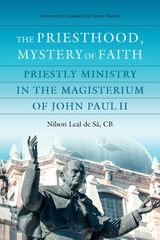
The Priesthood, Mystery of Faith
Priestly Ministry in the Magisterium of John Paul II
Nilson Leal de Sa, CB
Catholic University of America Press, 2022
After almost twenty-seven years of his pontificate, what was John Paul II’s legacy regarding the ministerial priesthood? What answers did he give to the questions still surrounding this reality today? Nilson Leal de Sá, CB, examines the pontiff’s twenty-seven letters of Holy Thursday addressed annually to the priests. Unlike some papal documents, which are drafted by many hands, these letters to priests were born of a personal initiative, wherein the pope spoke ab imo pectore (from the depths of his heart), giving a little of himself and his thought. Cardinal Georges-Marie Cottier, theologian emeritus of the Pontifical House and a connoisseur of the texts of the Holy Father, has confirmed that “the Letters of Holy Thursday were written by John Paul II himself.”
Leal de Sá has sought in the diversity of the letters of Holy Thursday the major points of the thought of John Paul II on this important topic. The first chapter dwells on the sources of his teaching and emphasizes his use of the Word of God, Tradition, and the conciliar Magisterium. These foundations are the basis of the second chapter, which highlights the priestly identity in the life of the Church. Finally, the third chapter elucidates the specific mission of the priest.
The Priesthood, Mystery of Faith presents itself as a real and stimulating synthesis of John Paul II’s thought about the ministerial priesthood in a systematic way. It renews us in the appreciation of the inestimable gift that God makes to the whole Church through the sacrament of the Holy Orders.
[more]
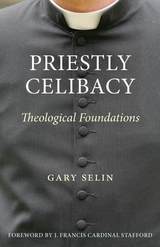
Priestly Celibacy
Gary B. Selin
Catholic University of America Press, 2016
Pope Francis has called mandatory priestly celibacy a "gift for the Church," but added "since it is not a dogma, the door is always open" to change. As this Church discipline continues to be debated, it is important for Catholics to delve into the theological and not merely pragmatic reasons behind its continuation. Priestly Celibacy: Theological Foundations, therefore, fills a critical gap in the current theological literature on this important topic of ecclesial ministry and life, and also helps to contribute to the advancement of the rather underdeveloped theology of priestly celibacy.
[more]
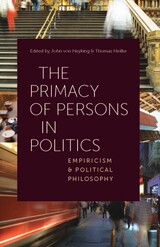
The Primacy of Persons in Politics
John von Heyking
Catholic University of America Press, 2013
Taking as their departure point the political-philosophical analyses of German scholar Tilo Schabert, the philosophical and empirical essays in this volume invite the reader to move beyond the sterile dichotomy of political activity as either pure will or as folded into a more manageable activity.
[more]
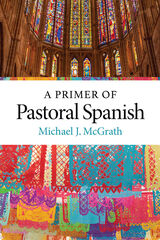
A Primer of Pastoral Spanish
Michael J. McGrath
Catholic University of America Press, 2022
A Primer of Pastoral Spanish is designed to provide clergy, religious and laity alike with the tools to be pastoral among Spanish-speaking people. This primer is modeled after Madrigal’s Magic Key to Spanish (1953), whose author, Margarita Madrigal, bases her methodology on creating with the language instead of memorizing it. Previous knowledge of Spanish is not necessary, although, as you will discover, you already know thousands of words in Spanish. The vocabulary you know in English is the foundation on which you can build your knowledge of Spanish vocabulary. There are thousands of English words that become Spanish words if you can recognize the slight change that takes place from one language to the other. For example, you will learn how to conjugate a verb in Spanish to the first-person singular of the past tense by dropping a letter from its translation in English and adding an accent. There are 40 units in this primer. If you were to study each unit 30 minutes a day throughout Lent, for example, think about how far you could progress. Each unit consists of four sections: Vocabulary, Prayer or Culture, Cornerstones, and Vocabulary Review. There are four Check Your Progress units. These present more Challenges based on the grammar, vocabulary, and culture you learned in the previous units. The answers to the Challenges are at the end of these units.
[more]
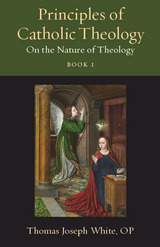
Principles of Catholic Theology, Book 1
On the Nature of Theology
Thomas Joseph White, OP
Catholic University of America Press, 2023
Catholic theology has to face a certain number of fundamental questions: what is the nature and content of Christian revelation, what are the sources of revelation, how are the mysteries of the faith to be understood in relation of one to another, and how do the truths of the Catholic faith relate to the acquisitions of natural reason. In the contemporary context, Catholic theology is marked by a diversity of approaches, many of which are seemingly incompatible or estranged from one another. How might we think about the unity of Catholic theology over and above the diversity of forms? What role, if any, can Aquinas play as a common doctor in facilitating exchanges between theological traditions in the Church?
Principles of Catholic Theology seeks to address directly the nature of Catholic theology and the challenge of its contemporary articulation with an eye towards its articulation in its Thomistic key. This book is also the first of a series of collections of essays by Thomas Joseph White, OP, extending over a range of fundamental topics in Catholic dogmatic theology.
[more]

Principles of Catholic Theology, Book 2
On the Rational Credibility of Christianity
Thomas Joseph White, OP
Catholic University of America Press, 2023
Can a philosopher defend the rational warrant for belief in Christianity? Is it reasonable to be religious? Is it philosophically responsible to be a Christian who believes in the mystery of the Trinity? Principles of Catholic Theology explores these questions in a systematic way by considering questions of ultimate explanation. Why not hold that modern atheistic naturalism provides the best explanation of reality? Or, if there is a transcendent first principle that explains all of reality, is it impersonal rather than personal? Contrastingly, if monotheism constitutes the best explanation for created being, how can we reasonably believe in any particular revelation concerning God? What are the criteria for rational belief in revelation?
Thomas Joseph White, OP, considers these questions by exploring a series of topics: the transcendentals (existence, oneness, truth, goodness, beauty); rational argument for the existence of God; the immateriality and subsistence after death of the personal soul of the human being; the historical and conceptual coherence of Trinitarian doctrine; and the reasonableness of the natural desire to see God. The aim of Principles of Catholic Theology, Book 2 is to place contemporary natural reason in profound dialogue with the Catholic faith and to think about ways that we can consent to the profound mystery of the Holy Trinity that are in robust concord with the knowledge obtained from philosophical, scientific, and historical sources.
[more]

Principles of Catholic Theology, Book 3
On God, Trinity, Creation, and Christ
Thomas Joseph White
Catholic University of America Press, 2024
What if anything can human beings know about God, either by way of philosophical reasoning or by divine revelation? How does the mystery of the Incarnation illuminate our understanding of the nature and mystery of God and the nature and destiny of the human person? The essays in this book explore topics pertaining to the nature of God, apophatic theology, divine simplicity and the holy Trinity, divine beauty, and the beauty of creation. The book also contains a series of speculative considerations of Christology: Why did God become human? How ought we understand the two natures of Christ and the topic of the communication of idioms (attribution of both divine and human properties to one person)? There is also a sustained treatment of Jesus' human knowledge and voluntary freedom. Did Jesus understand his own lordship and his unity with the Father and the Holy Spirit, and if so, how? Did Christ's human will always accord with the divine will, and what significance does this idea have for our understanding of the redemption affected by Christ for the whole human race? Through these explorations, principles drawn from Thomas Aquinas and from Thomistic tradition are taken into account as key resources for the adjudication of contemporary theological challenges.
Principles of Catholic Theology, Book 3 is a continuation of Fr. Thomas Joseph White's collection of essays, extending over a range of fundamental topics in Catholic dogmatic theology.
[more]
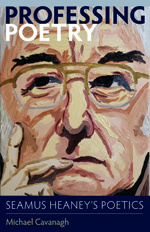
Professing Poetry
Seamus Heaney’s Poetics
Michael Cavanagh
Catholic University of America Press, 2009
The first full-length study of Heaney's poetics, Professing Poetry explores Heaney's unusual concept of influence and the various ways in which Heaney interacts with other writers
[more]
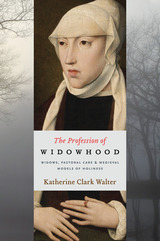
The Profession of Widowhood
Widows, Pastoral Care, and Medieval Models of Holiness
Katherine Clark Walter
Catholic University of America Press, 2018
The Profession of Widowhood explores how the idea of ‘true’ widowhood was central to pre-modern ideas concerning marriage and of female identity more generally. The medieval figure of the Christian vere vidua or “good” widow evolved from and reinforced ancient social and religious sensibilities of chastity, loyalty and grief as gendered ‘work.’ The ideal widow was a virtuous woman who mourned her dead husband in chastity, solitude, and most importantly, in perpetuity, marking her as “a widow indeed” (1 Tim 5:5). The widow who failed to display adequate grief fulfilled the stereotype of the ‘merry widow’ who forgot her departed spouse and abused her sexual and social freedom. Stereotypes of widows ‘good’ and ‘bad’ served highly-charged ideological functions in pre-modern culture, and have remained durable even in modern times, even as Western secular society now focuses more on a woman’s recovery from grief and possible re-coupling than the expectation that she remain forever widowed. The widow represented not only the powerful bond created by love and marriage, but also embodied the conventions of grief that ordered the response when those bonds were broken by premature death. This notion of the widow as both a passive memorial to her husband and as an active ‘rememberer’ was rooted in ancient traditions, and appropriated by early Christian and medieval authors who used “good” widowhood to describe the varieties of female celibacy and to define the social and gender order. A tradition of widowhood characterized by chastity, solitude, and permanent bereavement affirmed both the sexual mores and political agenda of the medieval Church. Medieval widows—both holy women recognized as saints and ‘ordinary women’ in medieval daily life—recognized this tradition of professed chastity in widowhood not only as a valuable strategy for avoiding remarriage and protecting their independence, but as a state with inherent dignity that afforded opportunities for spiritual development in this world and eternal merit in the next.
[more]
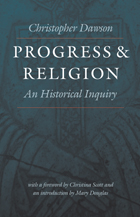
Progress and Religion
An Historical Inquiry (The Works of Christopher Dawson)
Christopher Dawson
Catholic University of America Press, 2001
Progress and Religion was perhaps the most influential of all Christopher Dawson's books, establishing him as an interpreter of history and a historian of ideas.
[more]
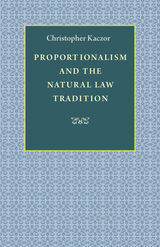
Proportionalism and the Natural Law Tradition
Christopher Kaczor
Catholic University of America Press, 2002
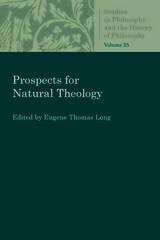
Prospects for Natural Theology
Eugene Thomas Long
Catholic University of America Press, 2018
Natural theology, which suffered significantly in the eighteenth century as a result of the criticisms of David Hume and Immanuel Kant, appeared to be a terminal patient in the mid-twentieth century in the 1960s, however philosophers and theologians began
[more]
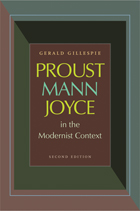
Proust, Mann, Joyce in the Modernist Context, Second Edition
Gerald Gillespie
Catholic University of America Press, 2010
The original version of Proust, Mann, Joyce in the Modernist Context strove to show how a kindred encyclopedic drive and sacramental sense informed their responses to the epochal trauma, yielding three distinct and monumental visions of the human estate by the 1920s.
[more]
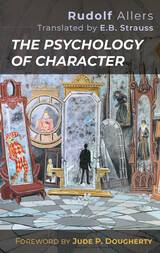
The Psychology of Character
Rudolf Allers
Catholic University of America Press, 2022
"How we became what we are. There are many explanations. One plausible account is found in the work of Rudolph Allers who writes about the European intellectual landscape from 1850 to the opening decades of the twentieth century...Allers is not alone in recognizing that a true account of human nature may await the recovery of classical antiquity. From Plato and Aristotle, modernity may learn that the immaterial or spiritual component of human nature is not empirically discerned but reasoned to from empirical evidence." - from the foreword by Jude Dougherty
[more]
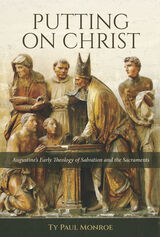
Putting on Christ
Augustine's Early Theology of Salvation and the Sacraments
Ty Paul Monroe
Catholic University of America Press, 2022
Putting on Christ aims to situate Augustine’s early soteriology and sacramental theology within the context of his personal history and intellectual development. Beginning with an extended analysis of the theology of salvation and sacramental efficacy contained within Augustine’s Confessions (ca. 400), the study then traces the maturation of his views on these matters, beginning with his earliest extant works, the Cassicacum dialogues (ca. 386). The journey entails treating Augustine’s earliest discussions of Christ’s person and his saving work, as well as the believer’s subjective experience of conversion and salvation. As Augustine’s corpus shifts from philosophical dialogues to explicitly apologetic and scriptural-exegetical works, so too does his soteriological lexicon expand to include concepts and terms that will later become his stock-in-trade, such as the virtue of humilitas. And as his roles in the North African Church come to include participation in the presbyterate and the episcopacy, so too does his engagement expand to a wider set of polemical contexts, both anti-Manichaean and anti-Donatist.
Putting on Christ tracks these and many other aspects of Augustine’s maturing thought, showing where lines of both continuity and development lie and aiming to uncover their reasons. In doing so, it reveals Augustine to be a thinker and a teacher who continued to hone his understanding of salvation, the very heartbeat of Christian life and thought, as well as its relation to various other aspects of the Christian theological worldview, from Christology and anthropology to sacramental theology and ecclesiology.
[more]
READERS
Browse our collection.
PUBLISHERS
See BiblioVault's publisher services.
STUDENT SERVICES
Files for college accessibility offices.
UChicago Accessibility Resources
home | accessibility | search | about | contact us
BiblioVault ® 2001 - 2024
The University of Chicago Press









